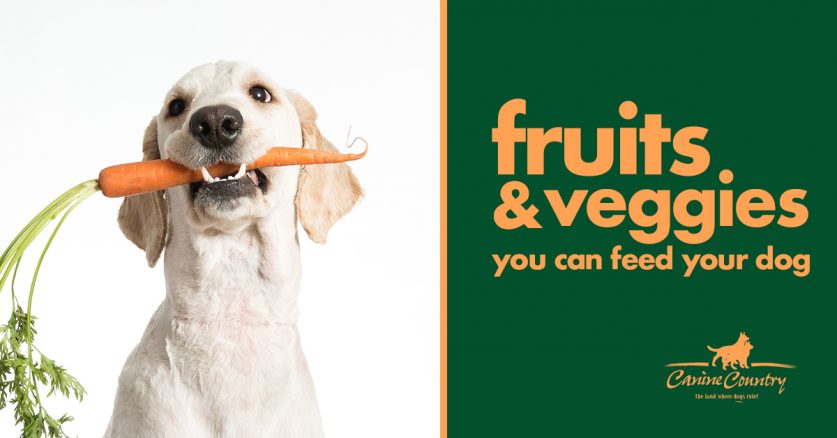
Fruits & Vegetables You Can Feed Your Dog
Posted Mar 6, 2020 in Health & Safety
Fruits and vegetables are important items in your diet, but what about Fido’s? Your furry friend most likely gets all the nutrients they need from their daily serving of food. But fruits and vegetables are a great alternative treat that a lot of the time you already have on hand.
However, not all fruits and vegetables are safe for your canine. The ones we’ve listed below are safe to give your pup (typically in moderation) any other fruits or vegetables not listed you should look up or ask your vet to ensure they’re not toxic for your pooch.
Fruits Dogs Can Eat
Most fruit contains an abundance of natural sugar, so moderation is key here.
- Apples: Before feeding this fruit to your pooch, it’s vital that you remove the stem, core, and seeds – as well as thoroughly washing it since apples tend to have the highest concentration of pesticides out of any fruit. On a positive note, though, apples are healthy treat alternatives that are relatively inexpensive. They’re also a great source of fiber and vitamins A & C.
- Bananas: This fruit is excellent if you dice it up into small pieces and then freeze it for a quick, bite-sized snack. You can even throw a little bit of peanut butter on there if you really want to treat your pup. Bananas are an excellent source of potassium, fiber, magnesium, and vitamin B6 & C.
- Blueberries: This tiny fruit can sometimes be a bit messy, but similarly to bananas, you can serve them frozen, and they’re a quick and easy treat to throw Fido’s way. Blueberries are full of fiber and vitamin C and increase the number of antioxidants in your pup’s body, all while being low in fat.
- Strawberries: Be sure to remove the leafy green top as well as to cut this fruit in half to avoid a choking hazard. Strawberries are a great choice for your canine companion, though, because they’re full of fiber, magnesium, potassium, iodine, folic acid, omega 3 fatty acids, and vitamin B1, B6, C & K.
- Watermelon (Seedless): It’s essential that you either buy a seedless watermelon or remove all of the seeds as well as the rind before feeding this to Fido. Watermelon (not surprisingly) is an excellent source of water. It’s also full of potassium, magnesium, and vitamins A & C.
Vegetables You Give Your Canine
As a pet parent, you’ll probably find feeding your dog vegetables to be a little harder than feeding them fruit. All dogs are different, though, so where some pups may spit out a leafy green, others may immediately gobble it up.
- Carrots: They’re easy to clean, peel, and chop up so you can feed them to your pup in controlled servings. If you don’t necessarily prefer chopping and cutting up carrots, you can always give your dog baby carrots instead. This vegetable is high in fiber, low in calories, and a great source of beta carotene and vitamin A. The crunchy texture of carrots also makes them useful for your pup’s teeth. However, they are high in carbohydrates, so they should still be given in moderation.
- Celery: Here we have another crunchy veggie that’s great for your pup’s teeth, celery. On top of that, it’s also an excellent course of calcium, potassium, iron, sodium, phosphorus, and vitamins A, B & C.
- Green Beans: When feeding this vegetable to Fido, you can be happy knowing it’s a great source of fiber, manganese, and vitamins A, C & K. Be sure to cut the ends off of green beans before giving them to your furry friend.
- Sugar Snap Peas: These veggies are packed full of nutrients. They’re a great source of fiber, protein, phosphorus, folate, zinc, manganese, potassium, as well as vitamins C & K.
- Zucchini: This vegetable is a great choice due to its low-calorie count. Zucchinis are also plentiful in dietary fiber and vitamins B & C.
Always remember to thoroughly wash and deseed any fruits or vegetables before feeding them to Fido. Also, keep in mind, not all dogs enjoy the same things, so you’ll most likely have to do a taste test to decipher what your pooch likes and what they don’t.